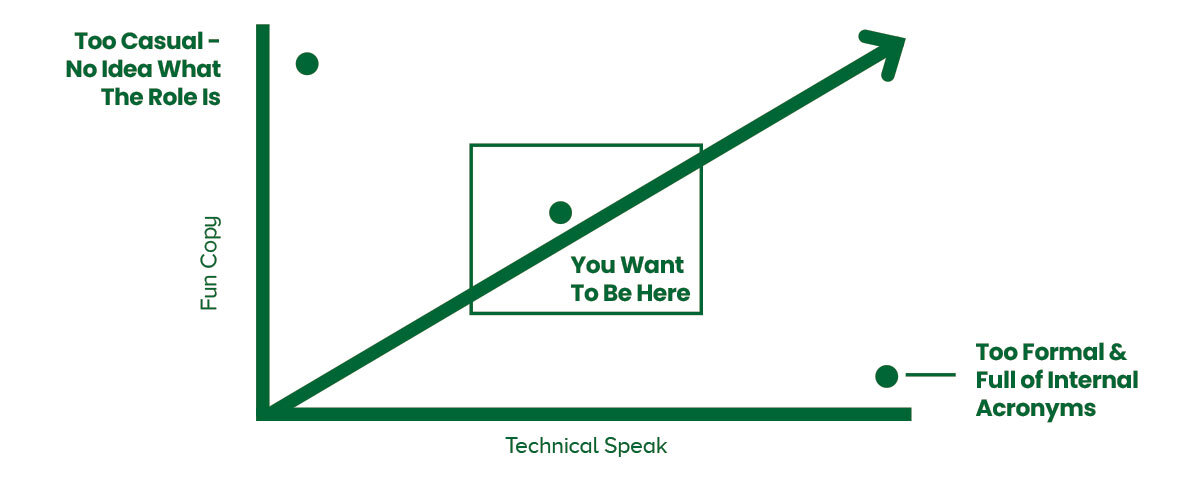Creating Your Tech Job Description
Tech job descriptions need a refresh. Craft clear and compelling ones with these tips.
To start, why do you need a great job description?
Clarity is attractive! Engineers have plenty of options and are typically very analytical people. It makes a great first impression to answer these questions from the get go!
You can use this full job profile as a job posting or use this to inform candidates and stakeholders as they move through your process.
Questions to start with internal alignment:
Why are we hiring this person? (Yes, really – you should make sure there is an answer other than "there is open headcount.")
List the work to be done rather than the job title you're used to. Then see what job you're really building.
How will you know in 6-12 months that you hired the right person? What will they have achieved or accomplished?
Why should a top performer want this opportunity in particular?
What does a typical day-in-the-life look like for this role?
Who are the stakeholders for this position? List managers, peers, customers, etc.
As we think about building the best possible team, are there gaps we need to address? For example, no one has HIPPA expertise and that's coming up on our roadmap.
What kind of workplace are we? Laid-back? Formal? The tone of your job description should reflect your culture.
Remote now or remote always?
This should be up top as it's a deal breaker for most candidates. People want to know whether they would be expected to go into the office now or in the future. It's not enough to say "remote" as people will still have questions.
What does this company do and why does that work matter?
The most important part here is “why does that matter”. Grandiose statements are unlikely to sit well here (see: Silicon Valley on HBO and any slogan they have there) but your company does exist for a reason! Share that reason here.
Example: Mpirik is addressing the undertreatment of heart diseases by collecting and analyzing data and using novel algorithms to automate patient identification for care. Our work makes sure people get the right care at the right time.
What does a day-in-the-life look like for this role?
Note: This isn't a list of bullet points. This is your opportunity to tell the story of what this person will be doing day to day.
Be very thoughtful of your language. For example, when you say that you want someone who is "entrepreneurial," you probably mean "thoughtful problem solver." But a candidate might perceive that as, "work long hours alone with little direction."
Balance your desire to highlight culture/benefits and technical needs.
What kinds of problems will this person solve?
Real examples! Avoid the catch all here! The requirements gathering, full-stack coding, DevOps expert is...unlikely. Instead this might be "improve our CI/CD pipelines" or "build new features on our existing mortgage product used by 2M users globally."
What is the team size and structure?
How big is the team? Are we all generalists? Will this person be a specialist in certain area? Will they be on one team or multiple teams?
Who will this person work with daily and how?
If people on your team have an impressive GitHub or notable blog, this could be a great chance to show people who they'll be able to work alongside. Top performers want to work with other smart people!
Environment: Tech Stack, Methodology, Dev Tools?
Are there any specific engineering practices that a candidate should know about? Scrum? Kanban? When listing your tech stack, make sure to include versions you're using!
Example: We love TDD. If you don't love TDD, you may not love it here.
Example: GitHub, Jira
Before you finish and hit 'Post,' here are some additional tips and tricks for your job description that will make a big difference for candidates:
Add a Quote from the Direct Manager
Give your candidate a chance to hear from their future manager. Something about what the manager loves about the team or company would be great here.
Write for Inclusion
Does the right hire actually need a Bachelors or Masters degree to be successful? Gut check – if someone with 8 years of applicable experience but no degree applied, could they do this job? If yes, take the degree requirement out or move to "nice to have."
Avoid pronouns if you can but if you do include them, use them all (he/her/them) rather than just he.
Check for gendered language. For example, avoid aggressive, competitive or assertive in favor of words like motivated, capable or exceptional. Everyone hates the ones that say rockstar, guru or ninja.
If your HR requires an EEOC statement (We're an equal opportunity employer...) keep it short and authentic. Recent studies show that these statements reduce applications by racial minorities by up to 30%. (Yes, really. Counterintuitive!)
Include a Salary Range
If you include it you'll likely get more applicants and those that do apply will already be open to the range you're willing to pay.

